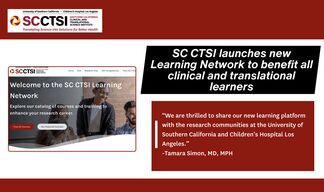The DHS-UCLA-USC Implementation Science 2019 Award Recipients
The Southern California Clinical and Translational Science Institute, along with the UCLA Clinical and Translational Science Institute and the Los Angeles County (LAC) Department of Health Services (DHS) have partnered to fund and support interventions that will help enhance the quality, efficiency and patient-centeredness of care provided by the LAC DHS.
LOS ANGELES, CA — The Southern California Clinical and Translational Science Institute, along with the UCLA Clinical and Translational Science Institute and the Los Angeles County (LAC) Department of Health Services (DHS) have partnered to fund and support interventions that will help enhance the quality, efficiency and patient-centeredness of care provided by the LAC DHS. Each participating CTSI selected one grant proposal to fund up to $75,000 each for up to one year to support the design and small scale implementation of interventions within DHS. Below are the 2019 USC and UCLA award recipients:
“The Hotfoot Line: Implementation and harmonization of an instant-triage program to speed care and eliminate preventable diabetes-related amputation in the Los Angeles County Department of Health Services.”
USC PIs
David G. Armstrong, MD, Professor of Clinical Surgery
Gregory A. Magee, MD, Assistant Professor of Clinical Surgery
Abstract:
Up to one third of people with diabetes will develop a foot ulcer. Non-healing or chronic ulcerations can lead to infection and subsequent amputation. Five-year mortality of people with chronic wounds, peripheral artery disease, and/or amputation is 50%, which exceeds most cancers. In LA County, there is a remarkable 10-fold variation in amputation rates based on zip code. Assembling a motivated and experienced interdisciplinary team dramatically improves limb salvage. We propose to conduct a 24-month study using a prospective cohort design. This will consist of six-month initial data collection at four institutions: two with a limb salvage team in place (Harbor-UCLA and Olive View) and two without a formal limb salvage team (LA County-USC and Rancho Los Amigos), evaluating all patients with diabetic foot complications requiring foot surgery or vascular intervention. From this, we will use lessons learned from the existing programs to develop a system for rapid triage, and harmonize across the DHS System using best practices. After the initial harmonization, we will compare outcomes in the 18 months after integrating the interdisciplinary “Hot Foot” Line. We anticipate that formation of this team will have a measurable reduction in high-level amputation, hospital length of stay, resource utilization (imaging and parenteral antibiotic), time to operating room, and time to appointment in post-acute (outpatient wound healing) clinics across the system. We also anticipate using this program as a model of care not only for other interdisciplinary county teams, but to help slow the scourge of diabetes related amputation, worldwide.
“County-Wide Implementation of Post-Operative Pain Management Guidelines with Reduction of Prescribed Opioids”
UCLA PI
Daniel DeUgarte, MD, Associate Professor of Surgery
Abstract:
Our proposal is a multidisciplinary Department of Health Services (DHS) quality improvement project intended to enhance the patient experience by standardizing post-operative pain management, reducing opioid prescriptions, preventing opioid diversion, and providing the framework for the development of opioid-sparing enhanced recovery after surgery (ERAS) protocols, which have the potential to reduce surgical complications, length of stay, and overall cost.
Currently, DHS providers overprescribe opioids and underutilize non-opioid and other modalities for the treatment of post-operative pain. An estimated 5%-10% of patients who receive opioids for surgery continue to take them up to a year later. Furthermore, DHS does not provide take-back sites for disposal of unused opioids. Diversion of unused opioids for recreational purposes can lead to opioid abuse. California law now mandates that DHS providers verify opioid prescription history with Controlled Substance Utilization Review and Evaluation System (CURES) unless they provide < 5 days of opioids following a procedure. The Joint Commission has mandated that DHS establish opioid protocols and metrics.
In order to promote compliance, optimize pain management, prevent opioid diversion, and enhance the patient experience, we have assembled champions at DHS training sites to update Expected Practices for postoperative pain management and develop a standardized post-operative pain management electronic medical record (EMR) order set. We intend to promote adoption of standardized guidelines by monitoring opioid prescriptions and providing feedback to providers. Pain management will provide a foundation for the development of enhanced recovery after surgery (ERAS) protocols that improve patient experience and outcomes. Finally, we plan to promote patient education about safe opioid disposal protocols and/or take-back sites at DHS facilities.
***
SC CTSI Acknowledgement
This work was supported by grant UL1TR001855 from the National Center for Advancing Translational Science (NCATS) of the U.S. National Institutes of Health. The content is solely the responsibility of the authors and does not necessarily represent the official views of the National Institutes of Health.



